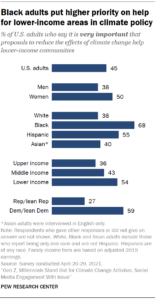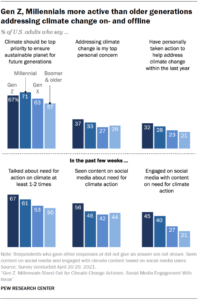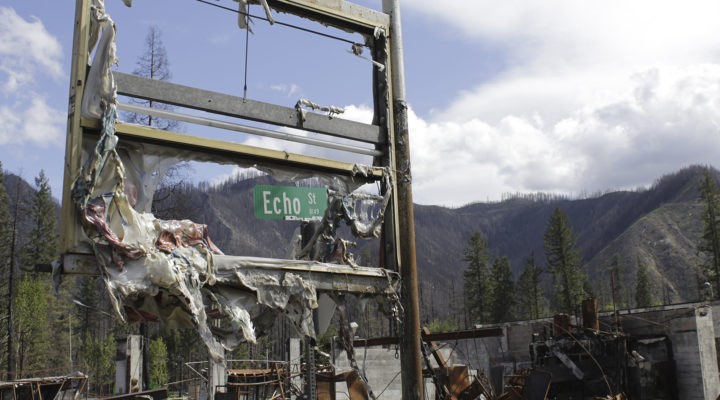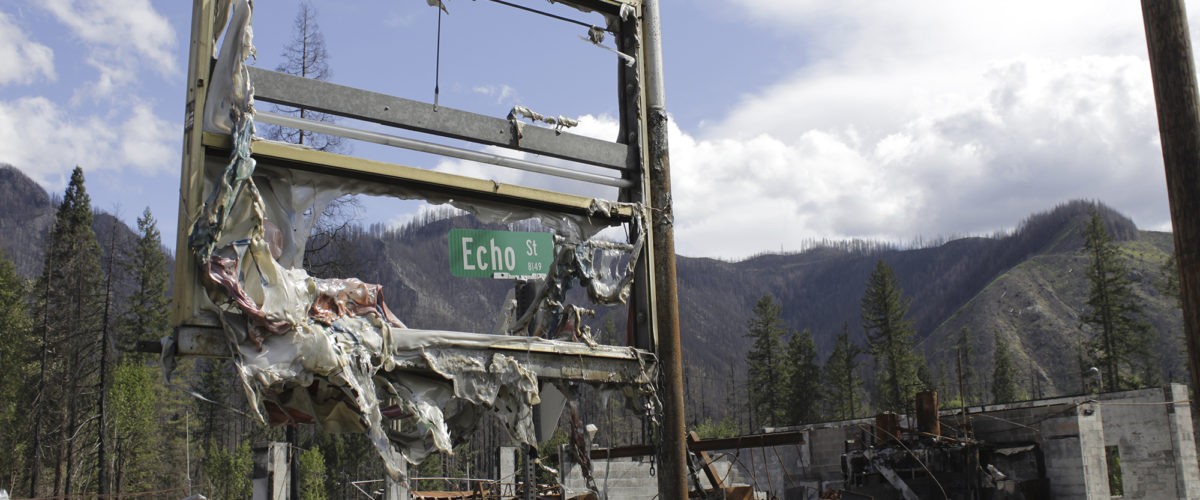In addition to the political and generational differences between Americans over climate change, there is a disproportionate impact of pollution, unsafe drinking water and other challenges occurring among people and communities of color. This is the finding a new national survey by Pew Research Center.
In Baltimore, Pastor Louis R. Tillman IV sees the reality of these findings every day. And he warns this isn’t just a matter of statistics for inner city neighborhoods like his.
“I’ve seen it. I believe it. We have to figure out ways to dismantle that environmental gap that exists in our country,” said Tillman, whose St. Philip’s Evangelical Lutheran Church has been on the forefront of bringing ecological justice to its community. “We’re trying to put flesh on our faith to move forward in the fight for environmental freedom.”
Pew’s new study confirms Tillman’s urban ministry experience.
 “Black and Hispanic adults are particularly likely to say they experience environmental problems in their local community, as are those with lower family incomes,” according to the report. “And when it comes to climate policy considerations, large majorities of Black and Hispanic adults — across income levels — say it’s very important to ensure that lower-income communities benefit from proposals aimed at reducing the effects of climate change.”
“Black and Hispanic adults are particularly likely to say they experience environmental problems in their local community, as are those with lower family incomes,” according to the report. “And when it comes to climate policy considerations, large majorities of Black and Hispanic adults — across income levels — say it’s very important to ensure that lower-income communities benefit from proposals aimed at reducing the effects of climate change.”
Some majority attitudes and more divisions
As Pew uncovered nationwide concerns about the impact of climate change on neighborhoods, they also found growing fissures between younger and older generations of Americans, as well as Democrats and Republicans, about the state of the environment, the source of destructive trends and what, if anything, individuals, businesses and government should do about it.
The study further uncovered significant majority attitudes, including the belief that action of some kind is needed to address negative environmental trends. Majorities of Americans “see an array of actors, from government to business, as doing too little to reduce the effects of climate change and are broadly supportive of a range of policy approaches that would help address climate change, including moving toward renewable energy sources, developing infrastructure for electric vehicles, and increasing taxes and restrictions on carbon emissions.”
The April 2021 survey of 13,749 U.S. adults found that 64% favor prioritizing climate change initiatives in order to preserve the planet for future generations. Only 34% favored making the environment a lower priority compared to other problems facing the country, Pew said.
“In line with the public’s view that climate change should be addressed today, majorities believe a range of public and private actors are not doing enough to help reduce climate impacts.”
Nearly 70% of respondents said large businesses and corporations are doing too little to reverse the effects of climate change, while 66% said the same about ordinary Americans. The energy industry, elected officials and respondents themselves also shared the blame at 62%, 60% and 47%, respectively, Pew reported.
“Consistent with past Center surveys, majorities also say the federal government is doing too little across a range of environmental concerns — such as protecting air and water quality — and 59% see it as doing too little to reduce the effects of climate change.”
Age and political affiliation
But wider gulfs between Americans came into view when Pew analyzed the data in terms of age and political affiliation.
 Researchers found that 71% of Millennials and 67% of Generation Z members identify the environment as a top priority in maintaining a sustainable planet, compared to 63% of Generation X and 57% of Boomers and older Americans.
Researchers found that 71% of Millennials and 67% of Generation Z members identify the environment as a top priority in maintaining a sustainable planet, compared to 63% of Generation X and 57% of Boomers and older Americans.
The survey also asked about actions taken to address climate change. Gen Z and Millennials, at 32% and 28%, said they had engaged in such activities in the past year, versus 23% of Gen X and 21% of Boomers.
Younger adults also are more likely than older Americans to express their views about the environment online, with 45% of Gen Z and 40% of Millennials reporting they had engaged the issue on social media. Gen X and Boomers trailed at 27% and 21%.
Younger generations were found to be much more likely to express a willingness to abandon fossil fuels and eliminate gas-powered cars and heavily favor prioritizing the development of alternative energy resources, Pew said.
Young adults outstripped their seniors in giving to environmental causes, contacting elected officials, volunteering or attending rallies.
“Younger Americans — Millennials and adults in Generation Z — stand out … particularly for their high levels of engagement with the issue of climate change. Compared with older adults, Gen Zers and Millennials are talking more about the need for action on climate change; among social media users, they are seeing more climate change content online; and they are doing more to get involved with the issue through activities such as volunteering and attending rallies and protests.”
Political divide worsens
When it comes to partisan politics, disagreements about climate change have widened over the past year — even more than during Donald Trump’s presidency — because Republicans have increased their opposition, Pew said.
Yet even the Republican party is experiencing the generational split Pew described.
The survey found that 49% of Gen Z and 48% of Millennial Republicans and those who lean Republican “say action to reduce the effects of climate change needs to be prioritized today, even if that means fewer resources to deal with other important problems; significantly fewer Gen X (37%) and Baby Boomer and older (26%) Republicans say the same.”
Republican views on climate change have shifted in the past year, leading to further separation from Democrats on the issue.
But as a whole, Republican views on climate change have shifted in the past year, leading to further separation from Democrats on the issue, Pew reported.
“Republican support for expanding wind and solar power, while still a majority, has decreased 13 and 11 percentage points, respectively, compared with a year ago when Trump was in office. The shares of Republicans and Republican leaners who support expanding hydraulic fracturing for oil and natural gas (up 10 points), offshore oil and gas drilling (up 6 points) and coal mining (up 6 points) have risen over the same period.”
Still, even a majority of Republicans join the 77% of Americans who believe human activity contributes to global climate change, said Pew, which also found that 57% of adults say their communities have been impacted by environmental changes.
“Overall, about six in 10 Americans say they see at least moderate problems where they live when it comes to an excess of garbage (62%) and water pollution in lakes, rivers and streams (60%). About half (52%) say the same about local air pollution, and about four in 10 say safe drinking water (41%) or a lack of greenspace (39%) are at least moderate problems.”
Disproportionate impact
The impact is greater on some than on others. “Past research has found that Black, Hispanic and Asian American communities are more likely to be exposed to air pollution and other environmental hazards in their local area,” the survey found.
And people of color reported immediate and direct impacts where they live.
“About four in 10 Black (41%) and Hispanic (37%) adults say the amount of garbage, waste and landfills in their community is a big problem. Black and Hispanic adults are also more likely than white adults to report that their community has big problems with air and water pollution, drinking water safety and a lack of greenspace and parks.”

Louis Tillman
In Baltimore, Tillman said there are actions faith groups can take to counter the impacts of climate change. His own church underwent an overhaul of its internal and external lighting fixtures, saving $20,000 annually in energy costs, with the savings going back into neighborhood ministries. The congregation also established a community garden in response to the food desert created when a local grocery store closed.
But the current needs also require activism, he said, hence his support for the Energy Innovation and Carbon Dividend Act, a bill that would seek to eliminate carbon pollution by 2050.
“We have been trying to work with other congregations, organizations and residents to endorse that act, which would tax corporations and put that money back into impoverished communities,” he said.
People of faith must come together in a justice movement to combat environmental racism and environmental violence. It’s simply another way of doing ministry, Tillman said. “We all do better when we all do better as a community and as a collective.”
Related articles:
Climate change is heating up the terrorist conflict in Africa’s Sahel region
Pro-Trump pastor Robert Jeffress uses Bible to debunk science of climate change
A lesson from Texas: Winterization of power stations and the Golden Rule
Oregon is burning while most white Christians deny climate science
The Joseph story offers a model: on climate change, the ‘what-to-do’ matters more than the ‘why’
Young adults say churches key in battle against climate change, poverty and corruption


